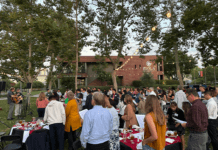TT: What is one of the most surprising things you’ve discovered in your research?
ES: One of our more recent projects, which led to the development of the Transformational Discipleship Assessment, found that 80 percent of those who attend church one or more times a month believe they have a personal responsibility to share their faith, but 61 percent have not told another person about how to become a Christian in the previous six months.
Maybe I should not be surprised, but it is telling to me that so many people say they believe something, yet do not act on it.
TT: Who are the “nones” and what is the rise of the “nones”?
ES: The Pew Forum on Religion & Public Life released data in 2012 in which they indicated that the number of Americans with no religious affiliation (identified as the “nones,” as in “none of the above”) is climbing.
A big part of what is happening is that the “nominals”—and by that I mean nominal mainline Protestants primarily, but nominal evangelicals as well—are shifting and becoming the “nones.”
This makes sense, as the cultural currency (in other words, the value a society places on identifying as a Christian) is decreasing. Thus, we see a movement away from Christian identity as a cultural value.
I think it’s fair to say three things about the rise of the “nones” (and I’ve condensed these from an article I wrote for USA Today):
First, we continue to lose what some have called our homefield advantage. Increasingly, identifying oneself as a Christian is not a means to societal advancement but can actually be a means to societal rejection.
I believe the future of Christianity in North America will look more like the present-day Pacific Northwest
Second, the “squishy middle” is collapsing. Nominalism will go its way. I believe the future of Christianity in North America will look more like the present-day Pacific Northwest, where there are robust churches (with fewer nominal believers) preaching the gospel in a predominantly post-Christian context.
Third, and finally, it is still a vast overstatement to see this as a collapse of the Christian faith in North America. The reality is that evangelicals have been relatively steady as a percent of the population over the last few years; however, there is still great cause for concern here—and for action.
TT: How should the church respond to the growing number of people who claim no religious affiliation?
ES: I think it is both a concern and an opportunity. I am concerned that people are moving away from any religious memory that so many churches could appeal to. In other words, you can’t bring the nones back to church—they simply don’t find it appealing.
But I also see an opportunity for churches to state clearly what a Christian is, as others are no longer claiming that title as frequently. Furthermore, teaching believers to live on mission in their contexts, rather than just to bring their friends to church, is how we will reach the nones.
So, as society moves away from Christian identification, let’s meet them on the road and say, “We did not believe in that expression of Christianity anyway. Let me tell you about Jesus and how He changes everything.”











